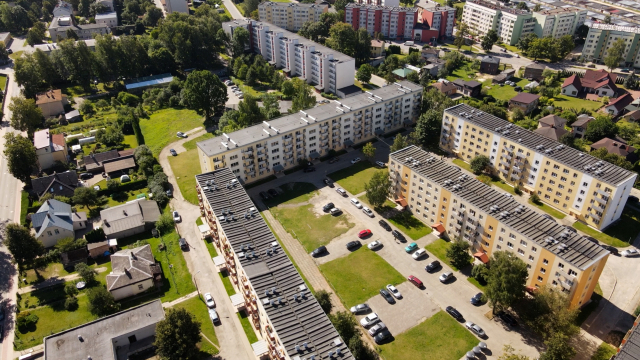The total annual volume of Latvia's construction sector is composed of several segments. The first and largest will be public orders this year, representing nearly 70% of the total turnover of the construction market, said Gints Miķelsons, head of the Latvian Construction Council.
"It is dominated by reconstructions, various types of objects that require energy efficiency. There are health establishments and educational establishments, defense objects. There are cultural and sports facilities too,” Miķelsons said.
The second largest volume in the construction sector is provided by commercial operators, trade, logistics centers, and production plants.
"There we see that the market has slowed down right now. Everyone knows the circumstances and reasons for this. Currently, inflation is starting to fall and construction prices are also stabilizing. We expect [works] to be, of course, still expensive this year, but not [with inflation of] 20-30%, but around sixteen percent. This will allow the commercial sector to do more this year," said Miķelsons.
The third sector is exports, which continue to grow at least at a rate of 10-15% a year. Finally, new housing projects are developed. Mārtiņš Vanags, chairman of the Alliance for Real Estate Developers Alliance, said plenty of new apartments will be available this year.
“This year about 3,000 new apartments will be put into service. They are all over Latvia, but an absolute majority of these are in Rīga. And as far as offices are concerned, there will be new office areas of approximately 10,000 square meters. [..] Around 10,000 people can live in 3,000 apartments and 10,000 m2 of offices are also jobs for around 10,000 people,” said Vanags.
He said that real estate developers, like builders, are also experiencing last year's rise in construction prices.
“The availability of apartments is also affected by Euribor rates. If a person could take a loan and purchase new housing worth €100,000, they can now purchase housing worth €70,000 with the same income. It can be assumed that the availability of new housing has decreased by 30%,” estimated Vanags.
This directly affects new housing bookings, which have fallen by about 40%.
“So of those 3,000 apartments that will be available on the market this year, about 1,500-2,000 have been booked. [..] A few years ago, we had reached a level where all the new projects that were built had already been sold on the day they were put into service,” Vanags said.
Meanwhile, there is positive growth in office-development trends this year, Vanags said.
Last year, Latvia's construction sector made a total of €2.5 billion per year, less than a year earlier.
“As compared to 2021, 2022 built about 10% less in both square meters and kilometers. There was a nuance in 2022 that no additional public funding entered the sector compared to 2021 [..]. This year, we forecast that the market volume could be similar to €2.5 billion. Within 5%, both up and down. This is hard to say right now. Rather a moderate recession,” Gints Miķelsons said.
He described this year's construction volumes: “If we are talking about building sites, there are some 5,000 construction sites currently active. Another 5,000 are engineering infrastructures - different roads, water, electricity, etc. It could be said that at the moment, 10,000 sites are building something."
SEB Bank economist Dainis Gašpuitis also said there was no basis to talk about rapid growth.
"If we look at the mood of construction, then we see it still negative this year, but a mild improvement in that negative mood has emerged. Given the statements from the Ministry of Finance that there are problems with fund absorption, this could mean that significant improvements in the sector are not expected this year. It should be hoped that these jobs will be accelerated, however, so that the money available will flow into the sector," said the bank expert.






























